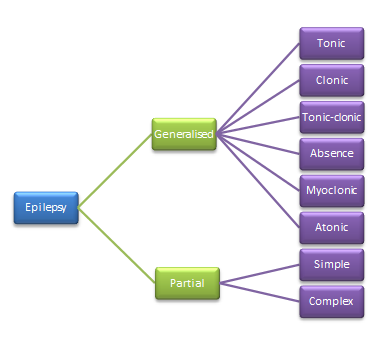Introduction
Epilepsy is a condition caused by sudden uncontrolled electrical changes which occur on parts of the brain. The changes cause interruption towards normal brain functions. This may lead to multiple seizures attack, loss of consciousness, and uncontrolled body movement.
Epilepsy is often managed by prescribing antiepileptic or anticonvulsant to the patients.
Choosing antiepileptic
There are various types and classes of antiepileptic drugs available in Malaysia. These include carbamazepine, lamotrigine, sodium valproate, levetiracetam, topiramate, phenytoin, gabapentin, clonazepam and phenobarbitone. Few factors considered before starting treatment with antiepileptic drugs are as follows:
- Types of epilepsy

- Possibilities of side effects
Side effects of antiepileptic drugs include headache, dizziness, sleepiness, and body weakness, lack of muscle control, fatigue and movement imbalance.
- Pregnancy
Women at child bearing age are advised to plan their pregnancy when taking antiepileptic drugs. This is to minimize the risk of seizures attack. Therefore, side effects towards pregnancy can be avoided or minimized.
Taking both oral contraceptives and antiepileptic drugs at the same time may cause drug-drug interaction. Contraceptive pills act in lowering the concentration of antiepileptic drugs in the patients’ blood, which may lead to seizure attack. In addition, certain antiepileptic drugs such as carbamazepine, lamotrigine, phenytoin and topiramate may reduce the effectiveness of oral contraceptive which may lead to unplanned pregnancy.
- Drug interactions
Other than drug interaction with oral contraceptive, there are also possibilities of interaction with other types of antiepileptic drugs when more than one type of medicines is taken. For example, carbamazepine lowers the blood concentration of sodium valproate which may results in seizures attack. Therefore, doctors will recommend the appropriate dose when patients need to take more than one type of antiepileptic drug.
Antiepileptic drug doses
Doctors will prescribe an appropriate dose of antiepileptic drug based on patients’ tolerance. Patients will be given a low dose of medication at the start of treatment. The dose will be increased gradually until the maintenance dose is reached, i.e. the dose at which the antiepileptic drugs are able to control patients’ seizures.
Transitioning in between antiepileptic drugs
Some patients will feel that the antiepileptic drugs taken are not able to control the seizures after a certain period. This may occur as a result of;
- Non-compliance towards medications
- Changes in severity of epilepsy
- Changes in the cause of epilepsy
- Low response of patients’ nervous system towards current antiepileptic medications
If this occurs, the patient should immediately consult the doctor to make changes to the dose or types of antiepileptic medication used in order to manage the condition.
Monitoring of drug levels in the blood
Occasionally, drug level monitoring in the blood is conducted to ensure that patients are compliance towards medication. This is also to check whether the side effects experienced by the patients are caused by high dose of antiepileptic drugs. In addition, monitoring is also conducted in special population such as patients undergoing surgery or pregnant mothers.
Important information
Compliance of antiepileptic medication along with taking the medication at the right dose and at the right time is important to prevent seizures.
Seek medical attention if any possible side effects of antiepileptic drugs occur. Inform the doctor if you are allergy to certain drugs, taking other types of medication or on contraceptive pill.
Discuss with your doctor if you are pregnant or planning to get pregnant or are breast-feeding. This is to allow the antiepileptic drug dose to be adjusted according to your current condition.
Do not stop taking antiepileptic drugs during pregnancy except under doctor’s directives.
Frequency of seizures may change from time to time due to changes in health condition. This may be caused by aging, stress or menopause. Thus, may cause changes in antiepileptic dose required to control seizures.
Some antiepileptic drugs may cause bone mineral loss from the patient, increasing the risk of osteoporosis and fractures. Therefore, patients are encouraged to consume high calcium and high vitamin D diet and also to avoid smoking and alcohol consumption.
References
- Consensus Guidelines on The Management of Epilepsy. 2010. Epilepsy Council Malaysian Society of Neurosciences
- https://www.epilepsy.org.uk
- https://patienteducation.osumc.edu
| Last Reviewed | : | 27 October 2017 |
| Translator | : | Siti Nurul Fathihah bt. Baharudin |
| Accreditor | : | Munira bt. Muhammad |







